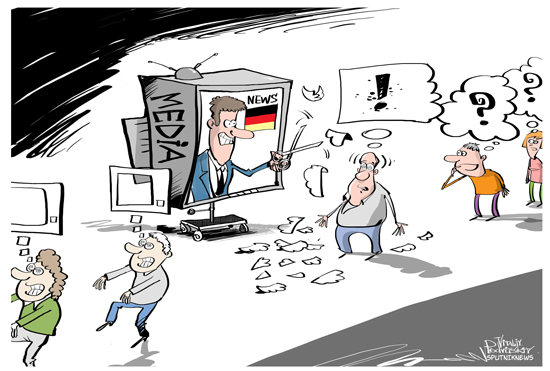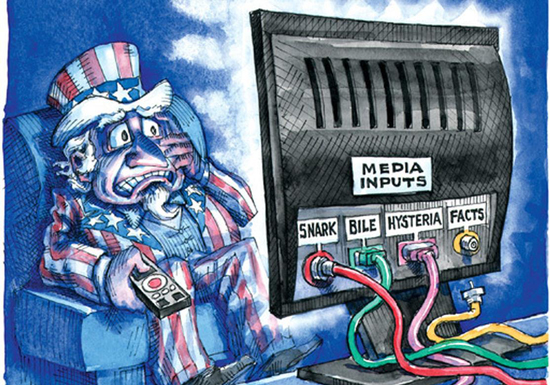The Original Pioneers of Mind Control on Why You Must Protect Your Mental Sovereignty Now

You don’t believe everything you see or hear in the media, do you? Good, because if you did believe it all you’d most likely end up on psychiatric meds.
You see, we live in a hyper-communicative environment, and we’re bombarded by an exceptional amount of messages and mediums practically every moment of every day. There is an insane amount of information coming at you, and most of it is intended to influence your thoughts or beliefs in ways profitable to the messenger.
This is the essence of mind control: influence someone’s thoughts, and you influence their behavior.
Every bit of media that you allow to enter your consciousness influences your thoughts and/or beliefs in very real ways. If you let it, that is. But most of us consume media in a very passive state of consciousness. Either in the background while doing something else, or after a long day when the brain is exhausted and your willpower has been sapped.
In this state, ideas and suggestions are absorbed by the subconscious mind where they go to work changing beliefs about the world and what you need in order to survive in it.
The key to maintaining sovereignty of your own mind is in being aware of just how real this impact is.
When you look back at the dawn of this era of mass communication, you find that as the technology of radio, television and film evolved, so did the scientific understanding of how these new mediums could be used to achieve the goals of those who create and distribute media for profit or propaganda.
The so-called father of modern propaganda, Edward Bernays, ruminates in 1928 about the need to control the habits and behaviors of democratized citizens. He asserts this as a responsibility of those in power.
The conscious and intelligent manipulation of the organized habits and opinions of the masses is an important element in democratic society. Those who manipulate this unseen mechanism of society constitute an invisible government which is the true ruling power of our country. We are governed, our minds are molded, our tastes formed, and our ideas suggested, largely by men we have never heard of… It is they who pull the wires that control the public mind. – Edward L. Bernays, Propaganda (1928).
Bernays was Sigmund Freud’s nephew, and was heavily influenced by Freud, steering his research in the direction of manipulative psychology. They developed what is essentially the crux of modern advertising, which is the ability to unlock one’s desires through messaging and imagery. These skills were immediately harnessed to turn citizens into consumers and obedient workers, taxpayers and soldiers.
“Who are the men who without our realizing it, give us our ideas, tell us whom to admire and whom to despise, what to believe about the ownership of public utilities, about the tariff, about the price of rubber, about the Dawes Plan, about immigration; who tell us how our houses should be designed, what furniture we should put in them, what menus we should serve on our table, what kind of shirts we must wear, what sports we should indulge in, what plays we should see, what charities we should support, what pictures we should admire, what slang we should affect, what jokes we should laugh at?” – Edward Bernays, Propaganda.

But where is all this going if we choose not to wake up and actively participate in the creation of our future? Aldous Huxley had a serious warning for us on this, calling out the subtle forces of social engineers that were emerging at the highest levels of industry and government.
“Impersonal forces over which we have almost no control seem to be pushing us all in the direction of the Brave New World nightmare; and this impersonal pushing is being consciously accelerated by representatives of commercial and political organizations who have developed a number of new techniques for manipulating, in the interest of some minority, the thoughts and feelings of the masses.” – Aldous Huxley, Preface to A Brave New World.
Brave New World was published in 1931, and Huxley has been proven right. Now the tools are far more complex, and also far more in your face at every turn. Two-time Pulitzer Prize winning author and influential propagandist Walter Lippmann spoke about how the public is basically a dumb wild beast that needs to be domesticated.
“Walter Lippmann, an American intellectual, writer and two-time Pulitzer Prize winner brought forth one of the first works concerning the usage of mass media in America. In Public Opinion (1922), Lippmann compared the masses to a ‘great beast’ and a ‘bewildered herd’ that needed to be guided by a governing class. He described the ruling elite as ‘a specialized class whose interests reach beyond the locality’. This class is composed of experts, specialists, and bureaucrats. According to Lippmann, the experts, who often are referred to as ‘elites’, are to be a machinery of knowledge that circumvents the primary defect of democracy, the impossible ideal of the ‘omnicompetent citizen’. The trampling and roaring ‘bewildered herd’ has its function: to be ‘the interested spectators of action’, i.e. not participants. Participation is the duty of ‘the responsible man’, which is not the regular citizen.” – Vigilant Citizen.
Here, Lippmann talks about the beneficial impacts of propaganda:
“That the manufacture of consent is capable of great refinements no one, I think, denies. The process by which public opinions arise is certainly no less intricate than it has appeared in these pages, and the opportunities for manipulation open to anyone who understands the process are plain enough… as a result of psychological research, coupled with the modern means of communication, the practice of democracy has turned a corner. A revolution is taking place, infinitely more significant than any shifting of economic power… Under the impact of propaganda, not necessarily in the sinister meaning of the word alone, the old constants of our thinking have become variables. It is no longer possible, for example, to believe in the original dogma of democracy; that the knowledge needed for the management of human affairs comes up spontaneously from the human heart. Where we act on that theory we expose ourselves to self-deception, and to forms of persuasion that we cannot verify. It has been demonstrated that we cannot rely upon intuition, conscience, or the accidents of casual opinion if we are to deal with the world beyond our reach.” – Walter Lippmann, Public Opinion.
And now, with nearly everyone walking around with a smartphone, you must realize that we are already hooked into a global neural-net, that for now, is only slowed down by limited digital bandwidth in the space between your phone and your brain. Once this bridge is gapped, there is basically nothing left to protect your mental sovereignty unless you decide to wake up and take the wheel.
yogaesoteric
January 25, 2019
